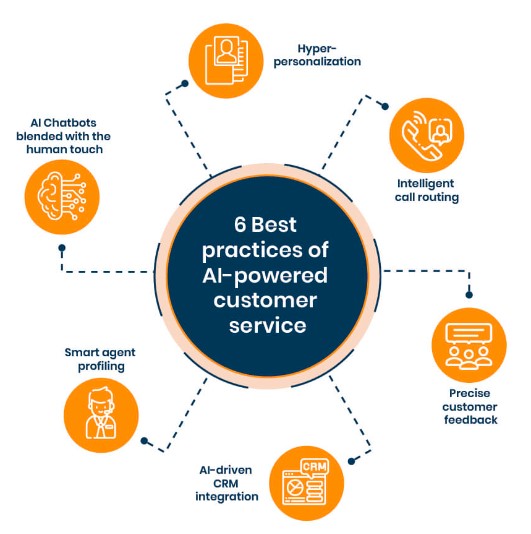The Role of AI in Enhancing Customer Experiences

In today’s digital-first world, customer expectations are higher than ever. Businesses constantly seek innovative ways to meet these expectations, and artificial intelligence (AI) has become a powerful tool for enhancing customer experiences. By personalizing interactions, improving response times, and anticipating customer needs, AI-driven solutions are reshaping how brands connect with their audience. Let’s explore how AI is revolutionizing customer experiences and why it’s essential for businesses looking to thrive in a competitive market.

1. Personalization at Scale
AI allows brands to personalize interactions on a level that was previously impossible. Through data analysis and machine learning algorithms, AI can analyze customer behavior, preferences, and past interactions to deliver tailored recommendations and content. This personalization leads to more meaningful engagements, as customers feel that brands understand their unique needs.
For example, streaming services like Netflix and music platforms like Spotify use AI to recommend content based on user preferences. This personalization keeps users engaged, increases customer satisfaction, and fosters brand loyalty.
Key Takeaway: Personalized experiences driven by AI help brands build stronger connections with customers, turning casual users into loyal advocates.
2. Enhancing Customer Support with AI Chatbots
One of the most impactful applications of AI in customer service is the use of AI-powered chatbots. These bots are available 24/7, offering immediate responses to customer inquiries and reducing wait times. Chatbots are not just for simple FAQs; advanced bots can handle complex queries, hand over conversations to human agents when necessary, and even learn from previous interactions to improve future responses.
AI chatbots, like those used by airlines, e-commerce sites, and banks, provide customers with seamless support, often resolving issues in minutes. This rapid assistance enhances the overall customer experience, leading to higher satisfaction rates.
Key Takeaway: AI chatbots streamline customer support, providing quick solutions and freeing up human agents to focus on more complex inquiries.
3. Predictive Analytics for Proactive Customer Engagement
AI enables businesses to leverage predictive analytics to anticipate customer needs before they arise. By analyzing patterns and historical data, AI can predict when a customer might need assistance or when they’re likely to make a purchase. This proactive approach allows brands to engage with customers at the right time, increasing the likelihood of conversions and fostering trust.
Retail companies, for instance, use predictive analytics to send personalized offers or reminders based on shopping habits, enhancing the overall shopping experience. This approach not only improves engagement but also boosts sales and strengthens brand loyalty.
Key Takeaway: Predictive analytics allows businesses to anticipate customer needs, improving engagement and creating a more proactive customer service experience.
4. Improving Accuracy in Product Recommendations
For e-commerce and retail businesses, recommending relevant products is crucial for driving sales. AI algorithms analyze browsing patterns, purchase history, and even social media activity to deliver accurate product recommendations. This level of precision in product recommendations not only enhances the shopping experience but also increases average order value.
Amazon’s recommendation engine is a prime example, as it suggests products based on individual browsing history, creating a personalized shopping journey that encourages users to explore more options.
Key Takeaway: AI-powered recommendations help customers find exactly what they’re looking for, enhancing their shopping experience and increasing purchase likelihood.
5. Sentiment Analysis for Customer Feedback
Understanding customer emotions and opinions is essential for delivering exceptional experiences. AI-driven sentiment analysis helps businesses monitor online reviews, social media comments, and customer feedback to gauge how customers feel about their products or services. This real-time feedback allows companies to respond promptly to negative sentiments or enhance positive experiences, improving overall brand perception.
Brands like Starbucks and Airbnb use sentiment analysis to monitor and respond to customer feedback, adjusting their strategies to align with customer expectations and maintain a positive brand image.
Key Takeaway: Sentiment analysis enables brands to stay connected with customer opinions, addressing issues promptly and enhancing brand loyalty.
6. AI in Voice and Visual Search for a Seamless User Experience
With the rise of voice assistants like Siri and Alexa, as well as visual search tools, AI has made it easier for customers to interact with brands in new, intuitive ways. Voice and visual search simplify the customer journey, enabling users to find products or services without typing. This convenience is especially appealing in retail, where customers can quickly locate items with a voice command or a photo.
Retailers like IKEA and ASOS leverage visual search to help users find products that match their preferences, creating a seamless and engaging experience.
Key Takeaway: AI-powered voice and visual search tools enhance user convenience, making it easier for customers to discover and purchase products.

Conclusion: Embracing AI for a Customer-Centric Future
As AI technology advances, its role in enhancing customer experiences will only grow. By leveraging AI’s capabilities, businesses can create personalized, proactive, and efficient interactions that meet today’s high customer expectations. Embracing AI is no longer optional for companies looking to stay competitive—it’s essential for building meaningful customer relationships and delivering outstanding experiences.
Businesses that adopt AI-driven solutions will not only meet customer demands but also set themselves apart as leaders in customer experience innovation.
#AI #CustomerExperience #ArtificialIntelligence #DigitalTransformation #Personalization #Chatbots #PredictiveAnalytics #CustomerSupport #VoiceSearch #VisualSearch #TechInnovation #FutureOfWork #HubForDigitalExcellence #CustomerSuccess #CXInnovation #DigitalCustomerJourney #CustomerSatisfaction #CustomerEngagement #AIInBusiness #SeamlessExperience




